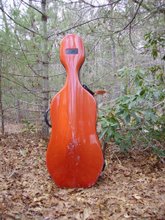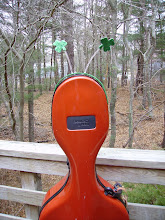 One of our two cats, snoozing on my fiddle, which is balanced on a chair in front of the digital piano. Resting on the keys are two native American flutes. The music on the piano is easy Christmas music from around the world. There is a conductor's baton and a container of guitar-shaped paper clips from the Hard Rock Cafe. The photographs are of our children, and Andre Previn, who autographed the photo to the kids as follows: "It is awful to practice, but we all have to do it. Good Luck!"
One of our two cats, snoozing on my fiddle, which is balanced on a chair in front of the digital piano. Resting on the keys are two native American flutes. The music on the piano is easy Christmas music from around the world. There is a conductor's baton and a container of guitar-shaped paper clips from the Hard Rock Cafe. The photographs are of our children, and Andre Previn, who autographed the photo to the kids as follows: "It is awful to practice, but we all have to do it. Good Luck!"The kids are excellent musicians, despite the fact that they don't practice much. I, on the other hand, need to practice (and also enjoy it). I read in the New Yorker that string bass player Edgar Meyer does not practice at all, but also that in a survey done of musical achievement, that the single most important factor in a musician's success was not talent or teacher, but rather amount of time spent practicing. The truth probably lies somewhere in the middle. Most people improve through practicing. Some are really gifted. And Edgar Meyer must practice a little!
The cats seem to enjoy music, in that they hang out with me when I practice, but you never catch them swaying to the beat, or letting an emotional tear fall at a particularly good (or bad) passage. I wonder if they hear the music at all or if they are just waiting for me to go to the kitchen to get us all a snack.












4 comments:
It is true that some people manage well in their musical careers with little or no practice. While I cannot verify this, I had been told through the years that violinist Itzhak Perlman is not a heavy practicer, nor is Kiri Te Kanawa, the great soprano. Whether those tales are true or not, I believe that practicing an instrument on a consistent basis (mine being violin) is the ultimate test of discipline AND commitment. I struggle with it as an adult, and I struggled with it in my youth. Now having support and encouragement in this area is an enormous gift, however there is always that small bit of resistance that allows all the rest of one's life responsibilities, aches and pains, fatigue, etc., to chip away at the true potential that practice offers. So, it is one of those things that leaves you very much alone to take the entire package and "create a market" for it in your own brain. I am still learning to do that. Although my practicing is not yet disciplined, playing almost every day, doing scales and things that I actually LIKE to play have improved my bowing, intonation and technique more than I could have expected over the past four months. Knowing that if I REALLY devote myself to it will bring further reward should be incentive to do more and more. But, I have to go to work, do the laundry, go food shopping, complain about aches and pains.
Seizing the moment seems to be the way to go - the ability to practice and play may be fleeting in our lives. I say we bite the bullet and do it.
Hi Laura,
After I read your comment, I practiced for 2 hours, and am feeling much better, even though I worked on only a couple of pieces. I should be more disciplined too, especially about the scales and the exercises. Knowing that you are making such good progress will encourage me, though sometimes my work deadlines overwhelm all good plans. My teacher says even 5 minutes a day, one well-played scale, is better than nothing, on days like that.
Hi Marilyn,
Your blog looks great. I'm inspired by your dedication and perserverance in your Suzuki books. I've been working in them for 5 years, and have spent almost a year now on the Breval Sonata in C, which is the first piece in Book 4. I still cannot do it justice.
Disciplined practice is so important. I want to write more about that in my blog as well.
I look forward to reading more of your blog. Keep practicing.
Hi Donna,
Good to hear from you. I enjoy your blog too, and glad to hear that you spend time and effort on these Suzuki pieces too. I had my book 2 recital 4 years ago, and then spent the better part of the next year reviewing and improving book 2. I was not happy about this at the time, but have come to agree with my teacher, that it makes no sense to move on until you can really play the pieces well. (Though I have to admit that I can't stand some of those book 2 pieces any more!)
I play lots of "lateral music," though, perhaps too much. But, for me, playing in ensembles helps so much with intonation, sight-reading skills, learning to play in a more musical way, and general enjoyment of music.
Post a Comment